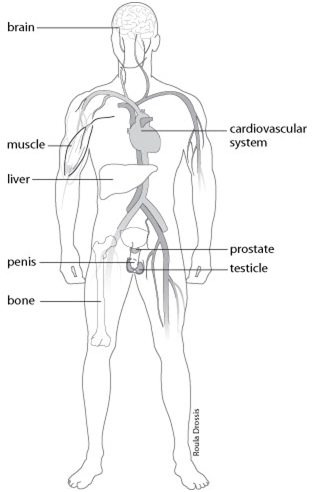
Many bodily functions are controlled by hormones, chemical messengers produced by various glands. Testosterone is the principal male sex hormone. Produced primarily in the testicles, it is essential in stimulating the development of male sexual characteristics in boys at puberty. In men, it helps maintain muscle and bone strength as well as sexual drive and performance.
After the age of 30, the normal testosterone level declines slowly but steadily in men. In some men, testosterone production declines more rapidly than others, although there is no sudden change comparable to menopause in women.
Today, men are living longer and many are seeking ways to improve their quality of life. Regular exercise, avoiding obesity, not smoking, limiting alcohol consumption, and eating a balanced diet have all been shown to be effective at maintaining good health.
Some believe that restoring testosterone to ‘youthful levels’ may reverse some of the changes of age: improving sexual function, muscle strength, bone health, and even, mood and mental function in aging men. Pharmaceutical companies, the media, and some physicians have promoted these possible benefits, suggesting that as much as a third of all men are testosterone deficient and requiring treatment. Annual sales of testosterone replacement treatments have increased dramatically in North America. This explosion in testosterone supplementation has occurred before science has answered fundamental questions regarding its safety and effectiveness.

A man’s testosterone level can be measured by a simple blood test. Testosterone levels vary over the course of the day reaching a peak early in the morning. For this reason the testosterone blood test should be obtained as early as possible in the day to obtain an accurate reading.
Testosterone exists in several forms in the bloodstream, each having a different level of activity. Several blood tests are available to measure testosterone levels. Each test measures a different portion of the total testosterone level in blood. Normal ranges vary widely between populations (for example – fit young men vs. fit middle-aged men vs. the general male population). All of these factors make it difficult to clearly define the point at which testosterone is truly deficient. In practice, one or two separate morning measurements of total testosterone are favoured.
In contrast to the well-defined symptoms of menopause in women, the symptoms of a slowly falling testosterone level may be absent or non-specific. These may include decreased sex drive, decreased muscle mass and strength, moodiness, sleep disturbance, and decreased energy…all of which are common in aging men. These changes are not necessarily due to deficient testosterone, but rather, to other factors like stress, depression, lifestyle, poor fitness or illness.
Benefits of testosterone supplementation are most notable in men with testosterone levels well below normal. These may include increased sex drive, increased muscle mass and improved bone density. In some, mood and mental function may also improve. When testosterone levels are low-normal, the benefits may be more difficult to appreciate.
Despite the frequent use of testosterone supplementation, the long-term benefits have not been proven and the potential risks of treatment are unknown. After many years of widespread use, the value of female hormone replacement after menopause recently has come into question after reports of increased risks. This suggests that male hormone replacement should be approached with some caution and after an in-depth discussion with us.
Changes in risk factors for heart and blood vessel disease have been identified, some beneficial and some unfavourable (like lower HDL, or good cholesterol, levels). The overall effect of these changes is unclear.
Testosterone may promote prostate enlargement and an increase in PSA level (the blood test used to help detect for prostate cancer). Although no clear link has been demonstrated between testosterone replacement and prostate cancer or the development of voiding difficulty from prostate enlargement, men at risk for these problems should be monitored regularly.
Blood levels of hemoglobin (the oxygen-carrying component of blood) may rise, typically by 5 - 20%, but occasionally by as much as 50%, increasing the risk of blood clots. This blood test must be monitored regularly while on testosterone replacement therapy.
In men with sleep apnea (pauses in breathing while asleep), the problem may worsen while on testosterone replacement therapy.
When supplementary testosterone is received, one’s own production of testosterone will often decrease resulting in some shrinkage of the testicles.
Testosterone supplementation may be received by injection (typically every few weeks) or the daily application of a skin patch, gel or cream. Tablets, although convenient, may not be entirely reliable at restoring a normal testosterone level. No form of testosterone supplementation can mimic the normal hourly and day-to-day variations in hormone secretion by the testicles.